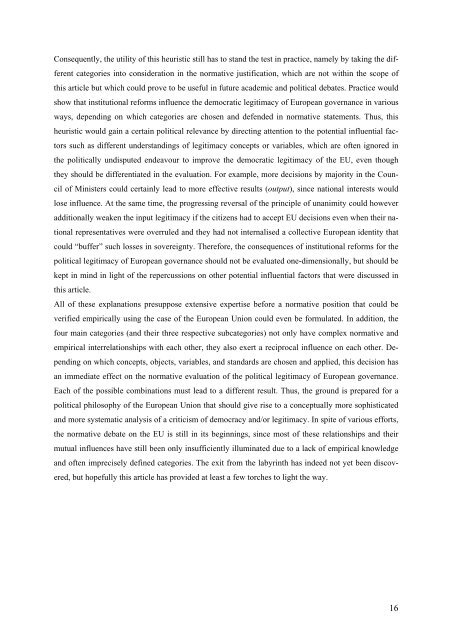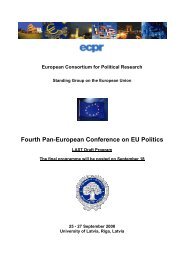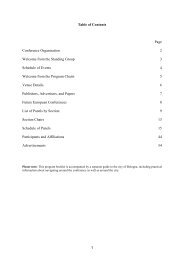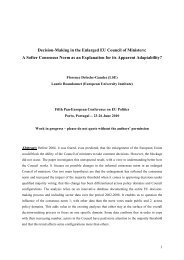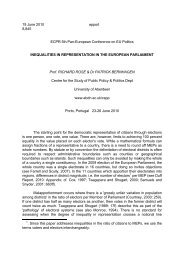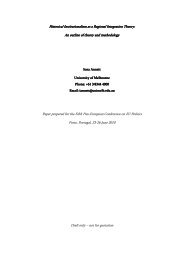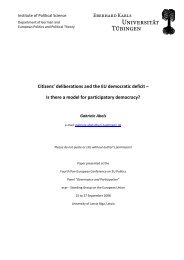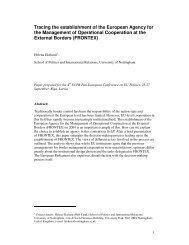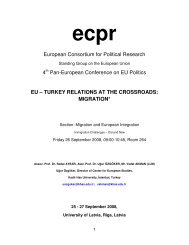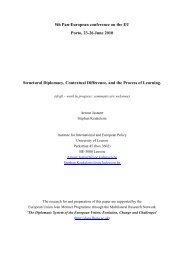Theorising the Democratic Legitimacy of European Governance
Theorising the Democratic Legitimacy of European Governance
Theorising the Democratic Legitimacy of European Governance
Create successful ePaper yourself
Turn your PDF publications into a flip-book with our unique Google optimized e-Paper software.
Consequently, <strong>the</strong> utility <strong>of</strong> this heuristic still has to stand <strong>the</strong> test in practice, namely by taking <strong>the</strong> dif-<br />
ferent categories into consideration in <strong>the</strong> normative justification, which are not within <strong>the</strong> scope <strong>of</strong><br />
this article but which could prove to be useful in future academic and political debates. Practice would<br />
show that institutional reforms influence <strong>the</strong> democratic legitimacy <strong>of</strong> <strong>European</strong> governance in various<br />
ways, depending on which categories are chosen and defended in normative statements. Thus, this<br />
heuristic would gain a certain political relevance by directing attention to <strong>the</strong> potential influential fac-<br />
tors such as different understandings <strong>of</strong> legitimacy concepts or variables, which are <strong>of</strong>ten ignored in<br />
<strong>the</strong> politically undisputed endeavour to improve <strong>the</strong> democratic legitimacy <strong>of</strong> <strong>the</strong> EU, even though<br />
<strong>the</strong>y should be differentiated in <strong>the</strong> evaluation. For example, more decisions by majority in <strong>the</strong> Council<br />
<strong>of</strong> Ministers could certainly lead to more effective results (output), since national interests would<br />
lose influence. At <strong>the</strong> same time, <strong>the</strong> progressing reversal <strong>of</strong> <strong>the</strong> principle <strong>of</strong> unanimity could however<br />
additionally weaken <strong>the</strong> input legitimacy if <strong>the</strong> citizens had to accept EU decisions even when <strong>the</strong>ir national<br />
representatives were overruled and <strong>the</strong>y had not internalised a collective <strong>European</strong> identity that<br />
could “buffer” such losses in sovereignty. Therefore, <strong>the</strong> consequences <strong>of</strong> institutional reforms for <strong>the</strong><br />
political legitimacy <strong>of</strong> <strong>European</strong> governance should not be evaluated one-dimensionally, but should be<br />
kept in mind in light <strong>of</strong> <strong>the</strong> repercussions on o<strong>the</strong>r potential influential factors that were discussed in<br />
this article.<br />
All <strong>of</strong> <strong>the</strong>se explanations presuppose extensive expertise before a normative position that could be<br />
verified empirically using <strong>the</strong> case <strong>of</strong> <strong>the</strong> <strong>European</strong> Union could even be formulated. In addition, <strong>the</strong><br />
four main categories (and <strong>the</strong>ir three respective subcategories) not only have complex normative and<br />
empirical interrelationships with each o<strong>the</strong>r, <strong>the</strong>y also exert a reciprocal influence on each o<strong>the</strong>r. Depending<br />
on which concepts, objects, variables, and standards are chosen and applied, this decision has<br />
an immediate effect on <strong>the</strong> normative evaluation <strong>of</strong> <strong>the</strong> political legitimacy <strong>of</strong> <strong>European</strong> governance.<br />
Each <strong>of</strong> <strong>the</strong> possible combinations must lead to a different result. Thus, <strong>the</strong> ground is prepared for a<br />
political philosophy <strong>of</strong> <strong>the</strong> <strong>European</strong> Union that should give rise to a conceptually more sophisticated<br />
and more systematic analysis <strong>of</strong> a criticism <strong>of</strong> democracy and/or legitimacy. In spite <strong>of</strong> various efforts,<br />
<strong>the</strong> normative debate on <strong>the</strong> EU is still in its beginnings, since most <strong>of</strong> <strong>the</strong>se relationships and <strong>the</strong>ir<br />
mutual influences have still been only insufficiently illuminated due to a lack <strong>of</strong> empirical knowledge<br />
and <strong>of</strong>ten imprecisely defined categories. The exit from <strong>the</strong> labyrinth has indeed not yet been discovered,<br />
but hopefully this article has provided at least a few torches to light <strong>the</strong> way.<br />
16


